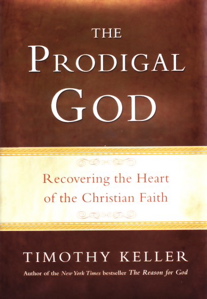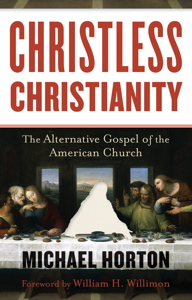Having just finished the book Christless Christianity, I intended to begin reading God of Promise: Introducing Covenant Theology, also by Michael Horton, but I opted  instead to start on The Prodigal God by Tim Keller. I am not finished with the book yet, but I read almost half of it in one sitting. Haven’t had time to read in the last day or two but hope to pick it up again this evening. Got to say it is an absolutely stellar read…so rich in unfolding the reckless grace, the heart of the Father’s forgiveness found in Christ’s parable of the prodigal son, a parable perhaps more accurately referred to as the parable of the two sons. Keller explores the parable with more a focus on the elder son yet without ignoring the nature of the prodigal son. He expounds on the prodigal nature of God’s grace, available to both sons, by using the more precise definition of the word ‘prodigal’ – recklessly extravagant, having spent everything. Too, his explaining of the historical context of the patriarchal nature of the ancient near east makes this parable even more profound. Nuff said for now.
instead to start on The Prodigal God by Tim Keller. I am not finished with the book yet, but I read almost half of it in one sitting. Haven’t had time to read in the last day or two but hope to pick it up again this evening. Got to say it is an absolutely stellar read…so rich in unfolding the reckless grace, the heart of the Father’s forgiveness found in Christ’s parable of the prodigal son, a parable perhaps more accurately referred to as the parable of the two sons. Keller explores the parable with more a focus on the elder son yet without ignoring the nature of the prodigal son. He expounds on the prodigal nature of God’s grace, available to both sons, by using the more precise definition of the word ‘prodigal’ – recklessly extravagant, having spent everything. Too, his explaining of the historical context of the patriarchal nature of the ancient near east makes this parable even more profound. Nuff said for now.
Finished with Christless Christianity
Almost immediately after writing it, I am struck by the irony of the title of this post. Usually, I compose the content of a post, then come up with a supposedly catchy, provocative title 😉
Today, I started with the title. The initial purpose of the title of this post was to declare that I have finished reading Christless Christianity: The Alternative Gospel of the American Church by Michael Horton thereby setting the stage for the content of the post, my thoughts on said book. The secondary purpose, though at first unintended, informs that I have seen, experienced much of what Horton describes.
I ran through this book rather quickly and will probably read it again sooner rather than later. From this first quick read, here are a few things I take away: Horton  diagnoses certain ills that infect the body of the American church, and two main themes seem to dominate. First, there is a strong element of Pelagianism that permeates much of the church. Secondly, there is a strain of Gnosticism that parallels the Pelagianism. This Pelagianism often takes on the form of a ‘legalism lite’ while the Gnosticism arrives in the form of the subtle primacy of subjective religious, emotional,self-focused experience over the objective authority of Scripture. His diagnosis is not unique to either of the broad, polar extremes of ecclesiology, the liberal and conservative branches; there is an overarching human-centricity that permeates both. He also points out the ironic commonality of the ‘deeds, not creeds’ mindset that has been so firmly ensconced in liberal Christianity and now boldly infects much of the church growth movement as well as the neo-liberal Emergents. Before continuing, Horton does not argue that the church, as a whole, has necessarily arrived at a Christless Christianity, but that signs are evident that the church is well on its way to that state. He argues that what is being engaged is not so much heresy, but more silliness, lightness, and self-focus. Almost gone are the days where the flock comes to church to be ministered to and taught, fed, truths of Scripture and have the sacraments administered. Some pastors no longer see their role as being one who feeds the flock and regularly administers the sacraments, but rather view church as the place where they cast vision and give marching orders to the flock. These marching orders can range from calls to engage those Joel Osteenesque steps to having a better life now to an exhortation to the flock to get out there and ‘be the Gospel’ without ever really and carefully explaining what the Gospel is, the proclamation of Good News given and offered to us more than something we ‘do’ or ‘are’. Think again on that ‘deeds, not creeds’ mentality previously mentioned.
diagnoses certain ills that infect the body of the American church, and two main themes seem to dominate. First, there is a strong element of Pelagianism that permeates much of the church. Secondly, there is a strain of Gnosticism that parallels the Pelagianism. This Pelagianism often takes on the form of a ‘legalism lite’ while the Gnosticism arrives in the form of the subtle primacy of subjective religious, emotional,self-focused experience over the objective authority of Scripture. His diagnosis is not unique to either of the broad, polar extremes of ecclesiology, the liberal and conservative branches; there is an overarching human-centricity that permeates both. He also points out the ironic commonality of the ‘deeds, not creeds’ mindset that has been so firmly ensconced in liberal Christianity and now boldly infects much of the church growth movement as well as the neo-liberal Emergents. Before continuing, Horton does not argue that the church, as a whole, has necessarily arrived at a Christless Christianity, but that signs are evident that the church is well on its way to that state. He argues that what is being engaged is not so much heresy, but more silliness, lightness, and self-focus. Almost gone are the days where the flock comes to church to be ministered to and taught, fed, truths of Scripture and have the sacraments administered. Some pastors no longer see their role as being one who feeds the flock and regularly administers the sacraments, but rather view church as the place where they cast vision and give marching orders to the flock. These marching orders can range from calls to engage those Joel Osteenesque steps to having a better life now to an exhortation to the flock to get out there and ‘be the Gospel’ without ever really and carefully explaining what the Gospel is, the proclamation of Good News given and offered to us more than something we ‘do’ or ‘are’. Think again on that ‘deeds, not creeds’ mentality previously mentioned.
Horton, with much clarity, traces the pragmatic methods of Charles Finney, quite frankly Pelagian in his theology, to the formulas used by contemporary church growth experts today. The fallout from this pragmaticism is often an unintended devaluing of the supremacy of Christ in both corporate worship and evangelism. Rather, church is to be an entertaining event to draw crowds wherein the Gospel (hopefully) may be found on a table filled with personal anecdotes and calls to moralism by self-effort without a clear expounding of the absolutely astounding nature of grace through faith found in Christ, God incarnate, in light of our sin nature, our total depravity. We end up, sadly, with a de-clawed Gospel, that ‘therapeutic, moralistic deism’ mentioned in a quote in the book. Even more sad, so many are content with just that. What is often engaged in that often ill-defined call to a personal relationship with Jesus, is a narcissism, a salvation solely focused on self rather than one lived out in covenant community. I have been guilty…
All in all, a sobering read, clear and concise. Another good book in the same vein is The Courage to Be Protestant: Truth-lovers, Marketers, and Emergents in the Postmodern World by David Wells. Next on the list to read, God of Promise: Introducing Covenant Theology, also by Horton.
Hey! It dawns on me…this is my first book review ever. It dawns on me, too, how hard it is to be objective when you are close to the subject matter of the book being reviewed.
A quote from ‘The Courage to Be Protestant’…
by David Wells:
Across much of evangelicalism, but especially in the market-driven churches, one therefore sees a new kind of leadership among pastors now. Gone is the older model of the scholar-saint, one who was as comfortable with books and learning as with the aches of the soul. This was the shepherd who knew the flock, knew how to tend it, and Sunday by Sunday took that flock into the treasures of God’s Word. This has changed. In its placed is the new ‘celebrity’ style. What we typically see now, Nancy Pearcey suggests, is the leader who works by manipulating the feelings of the audience, enhancing his own image with personal anecdotes, modeling himself after the CEO, and adopting a domineering management style. He (usually) is completely results-oriented, pragmatic, happy to employ and technique from the secular world that will produce the desired results. And this leader has to be magnetic, entertaining, and light on the screen up front. (pg. 40)
I am so thankful for the pastors, the scholar-saints, the under-shephards, that remain faithful to the Biblical mandate and calling to feed the sheep.
Perhaps now, after so many posts on ecclesiastic issues, I will move to and graze in other topical pastures in this ‘blogging’ venture…..